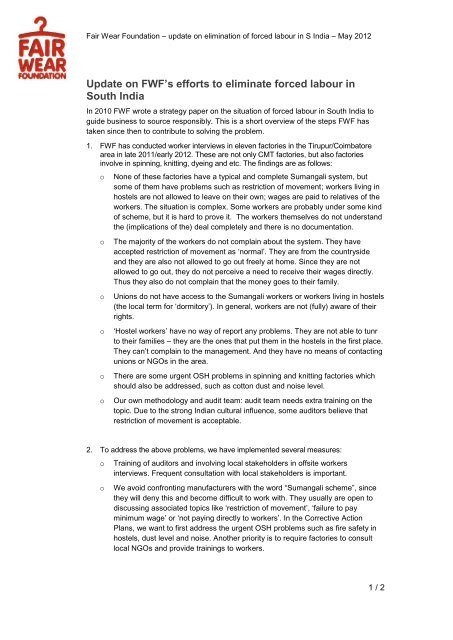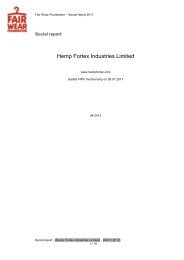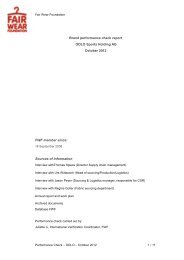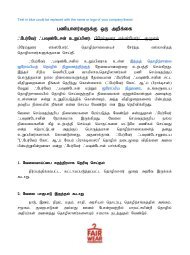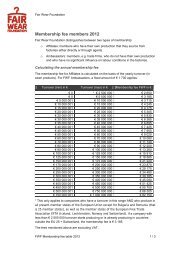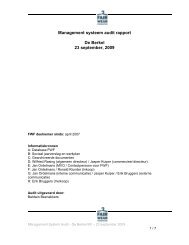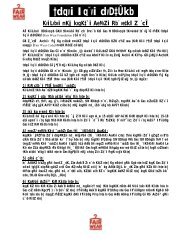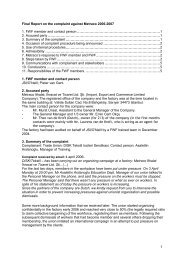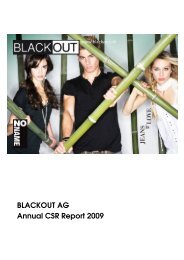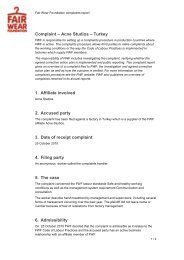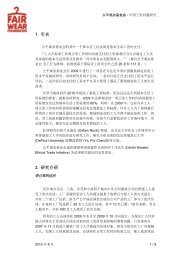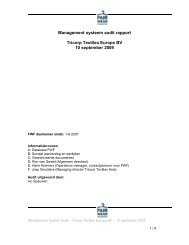Sumangali - FWF update - Fair Wear Foundation
Sumangali - FWF update - Fair Wear Foundation
Sumangali - FWF update - Fair Wear Foundation
Create successful ePaper yourself
Turn your PDF publications into a flip-book with our unique Google optimized e-Paper software.
<strong>Fair</strong> <strong>Wear</strong> <strong>Foundation</strong> – <strong>update</strong> on elimination of forced labour in S India – May 2012<br />
Update on <strong>FWF</strong>’s efforts to eliminate forced labour in<br />
South India<br />
In 2010 <strong>FWF</strong> wrote a strategy paper on the situation of forced labour in South India to<br />
guide business to source responsibly. This is a short overview of the steps <strong>FWF</strong> has<br />
taken since then to contribute to solving the problem.<br />
1. <strong>FWF</strong> has conducted worker interviews in eleven factories in the Tirupur/Coimbatore<br />
area in late 2011/early 2012. These are not only CMT factories, but also factories<br />
involve in spinning, knitting, dyeing and etc. The findings are as follows:<br />
o None of these factories have a typical and complete <strong>Sumangali</strong> system, but<br />
some of them have problems such as restriction of movement; workers living in<br />
hostels are not allowed to leave on their own; wages are paid to relatives of the<br />
workers. The situation is complex. Some workers are probably under some kind<br />
of scheme, but it is hard to prove it. The workers themselves do not understand<br />
the (implications of the) deal completely and there is no documentation.<br />
o The majority of the workers do not complain about the system. They have<br />
accepted restriction of movement as ‘normal’. They are from the countryside<br />
and they are also not allowed to go out freely at home. Since they are not<br />
allowed to go out, they do not perceive a need to receive their wages directly.<br />
Thus they also do not complain that the money goes to their family.<br />
o Unions do not have access to the <strong>Sumangali</strong> workers or workers living in hostels<br />
(the local term for ‘dormitory’). In general, workers are not (fully) aware of their<br />
rights.<br />
o ‘Hostel workers’ have no way of report any problems. They are not able to tunr<br />
to their families – they are the ones that put them in the hostels in the first place.<br />
They can’t complain to the management. And they have no means of contacting<br />
unions or NGOs in the area.<br />
o There are some urgent OSH problems in spinning and knitting factories which<br />
should also be addressed, such as cotton dust and noise level.<br />
o Our own methodology and audit team: audit team needs extra training on the<br />
topic. Due to the strong Indian cultural influence, some auditors believe that<br />
restriction of movement is acceptable.<br />
2. To address the above problems, we have implemented several measures:<br />
o Training of auditors and involving local stakeholders in offsite workers<br />
interviews. Frequent consultation with local stakeholders is important.<br />
o We avoid confronting manufacturers with the word “<strong>Sumangali</strong> scheme”, since<br />
they will deny this and become difficult to work with. They usually are open to<br />
discussing associated topics like ‘restriction of movement’, ‘failure to pay<br />
minimum wage’ or ‘not paying directly to workers’. In the Corrective Action<br />
Plans, we want to first address the urgent OSH problems such as fire safety in<br />
hostels, dust level and noise. Another priority is to require factories to consult<br />
local NGOs and provide trainings to workers.<br />
1 / 2
<strong>Fair</strong> <strong>Wear</strong> <strong>Foundation</strong> – <strong>update</strong> on elimination of forced labour in S India – May 2012<br />
o The key strategy is to give a voice to the workers, so that they will – in time -<br />
express their needs. We believe that the follow-up is to ensure their right to<br />
organise and provide them information.<br />
a. <strong>FWF</strong> is carrying out a project funded by the UN Trust Fund to End<br />
Violence Against Women. The project aims to set up functioning antiharassment<br />
committees in the factories supplying <strong>FWF</strong> members. It<br />
includes trainings to workers and management on what constitutes<br />
harassment and violence, elections to set up anti-harassment<br />
committees and follow-up support. According to local regulations, a<br />
woman member of a reputable NGO must participate in the<br />
committee. <strong>FWF</strong> is working with SAVE in this project. We believe this<br />
project could give us and the local partners access to hostel workers<br />
and <strong>Sumangali</strong> workers.<br />
b. As part of the project, we will organise a local stakeholder forum,<br />
involving the government to discuss this issue. This will create a<br />
supportive environment.<br />
c. <strong>FWF</strong> has set up an extra complaints hotline for harassment issues. We<br />
will enhance the complaints mechanism in 2012.<br />
o <strong>FWF</strong> has made efforts to work with other MSIs and business initiatives on this<br />
issue. There may be closer cooperation in the future.<br />
o Due to visa problems of <strong>FWF</strong> verification staff, the supplier workshop had to be<br />
postponed until 2012. In the meantime, <strong>FWF</strong> conducted management interviews<br />
at two factories. During the interviews, the interviewer informs factory<br />
management about the expectations and commitment of <strong>FWF</strong> and its affiliates.<br />
More management interviews will be conducted in 2012.<br />
2 / 2


